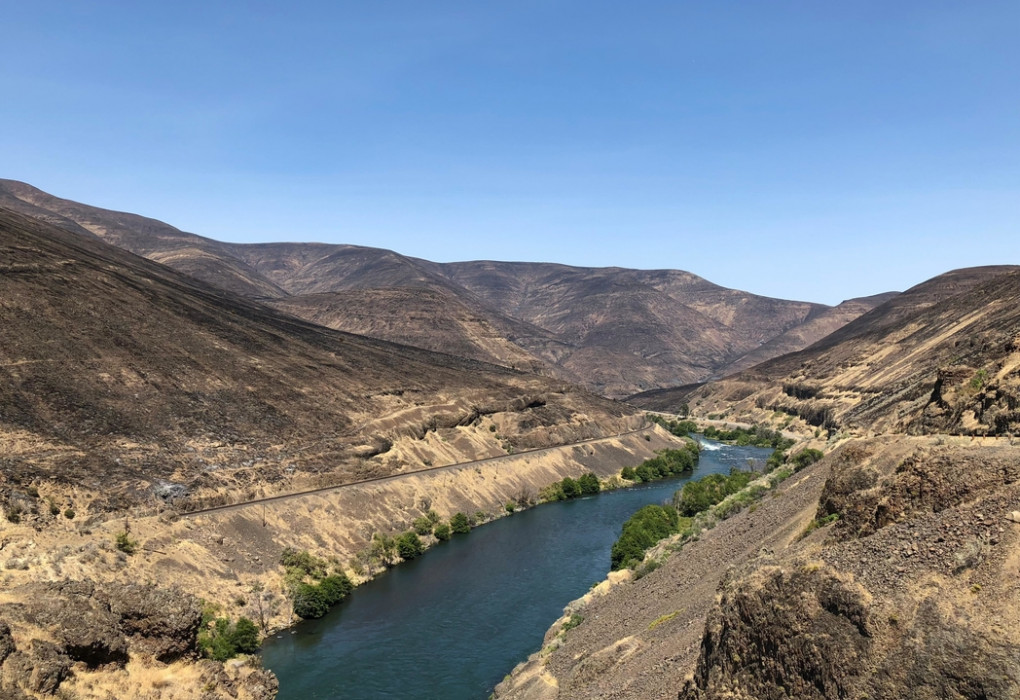A Long, Hot Summer for the Deschutes
It has been a hard year for the Deschutes River and its native fish. Below average snowpack in the higher elevations followed by an early, hot, and long summer drove water temperatures into lethal ranges for native fish. In July, the Long Hollow Fire ignited in a wheat field near Dufur, Oregon. Strong summer winds sent it racing down to the lower Deschutes River, scorching the hillsides and torching streamside trees, vegetation, and recreation areas.
Amidst the developing turmoil, advocates for the river, its fish, and the communities that treasure this remarkable basin continue to advance the cause of recovery for wild fish and their homewaters. Native Fish Society remains steadfast in pursuing our goals to improve water quality in the lower river and to address the lack of progress in achieving meaningful reintroduction of anadromous fish in the upper basin. As the scorching summer gives way to cooler temperatures, it’s time to take a look at where we are at in our efforts to protect and restore the Deschutes basin.
Addressing Water Quality Problems:
The water quality of the lower river remains a central concern and focus of the organization and our allies working in the basin. We know that the best chance to recover, sustain, and reintroduce native fish in the basin depends on their access to clean, healthy habitats. We await the publication of PGE’s water quality study and are working with our NGO partners on the Fish Committee, including American Rivers and Trout Unlimited, to execute an external, independent review of the study once the report becomes available this fall. It is critical that the models produced are as representative as possible of the parameters affecting water quality in order to best inform the operational adjustments that may be necessary to ensure that the Pelton Round Butte hydropower project minimizes water quality impacts to the lower river. Our fish and river need cooler water temperatures in early summer, reduced algal growth, and increased dissolved oxygen for resident trout spawning.
In conjunction, we continue to call for a public and transparent process to set formal water quality standards for the project. The existing interim agreements, which relax temperature and dissolved oxygen standards for the project, were never vetted by the public when they were implemented more than a decade ago. The Confederated Tribes of Warm Springs has drafted and submitted water quality standards for their Tribal Nation to the US Environmental Protection Agency for consultation. It is time for the Oregon Department of Environmental Quality (ODEQ), who oversees the water quality certification for the project, to initiate the process to establish permanent certifications through a thorough and transparent public process. To that end, we continue to engage the public, encouraging them to sign postcards or send letters to Oregon Governor Brown and ODEQ Director Whitman requesting that they ensure the protection of water quality and wild trout, salmon, and steelhead in the lower river.
Safeguarding, Restoring, and Reintroducing Wild, Native Fish:
Successful reintroduction of anadromous fish above the project continues to elude managers and partners of the reintroduction process. Adult returns to date for 2018 remain in the single digits for spring Chinook and summer steelhead, well below the long-term reintroduction goal of nearly 1,000 fish of each species.
A task force was convened this summer to address the concerns of NFS and Fish Committee partners around a lack of firm timelines and benchmarks for reintroduction. NFS and our NGO partners are participating in this process to ensure that measurable goals and an adaptive management plan are in place to guide the reintroduction program. Each management decision must be grounded in the best available science and cultural wisdom, have clear and measurable goals, objectives and timelines, and ongoing assessment to determine whether the outcomes were as anticipated.
After ten years, it is time to revisit the Reintroduction and Conservation Plan for Anadromous Fish to determine if the goals and methods prescribed for reintroduction are still viable and relevant. Recent proposals by PGE to eliminate fry stocking (converting to increased smolt releases in the coming years) and implement the outplanting of excess adult hatchery broodstock above the project, must be thoroughly vetted and integrated into an adaptive management plan. In particular, questions around the efficacy, genetic impacts, and possible transmission of pathogens must be assessed and weighed.
Beyond the project:
The Pelton Round Butte dam project is not the only factor hindering reintroduction efforts and water quality in the basin. Major efforts around the basin are underway to address water allocation and flows, human and agricultural impacts on water quality, and restore riparian and aquatic habitat. NFS staff and River Stewards in the basin continue to identify new opportunities to engage in these efforts in a strategic manner.
And outside of the basin, we are using the knowledge we have gained on the Deschutes to assess fish passage opportunities elsewhere. As reintroduction efforts fail to show progress on the Deschutes, NFS is taking the lessons learned there to advocate for caution as other systems propose similar non-volitional fish passage designs. With juvenile passage efficiencies continuing to fail to meet performance targets mandated in the licensing agreement and with dismal adult returns thus far, we are not persuaded that similar methods would succeed elsewhere (such as is being proposed for the Detroit Dam complex on the North Santiam).
Even as fall brings cooler temperatures for our wild, native fish in the Deschutes River, concerns over water quality and reintroduction efforts will continue to be hot topics for NFS and stakeholders around the basin.
